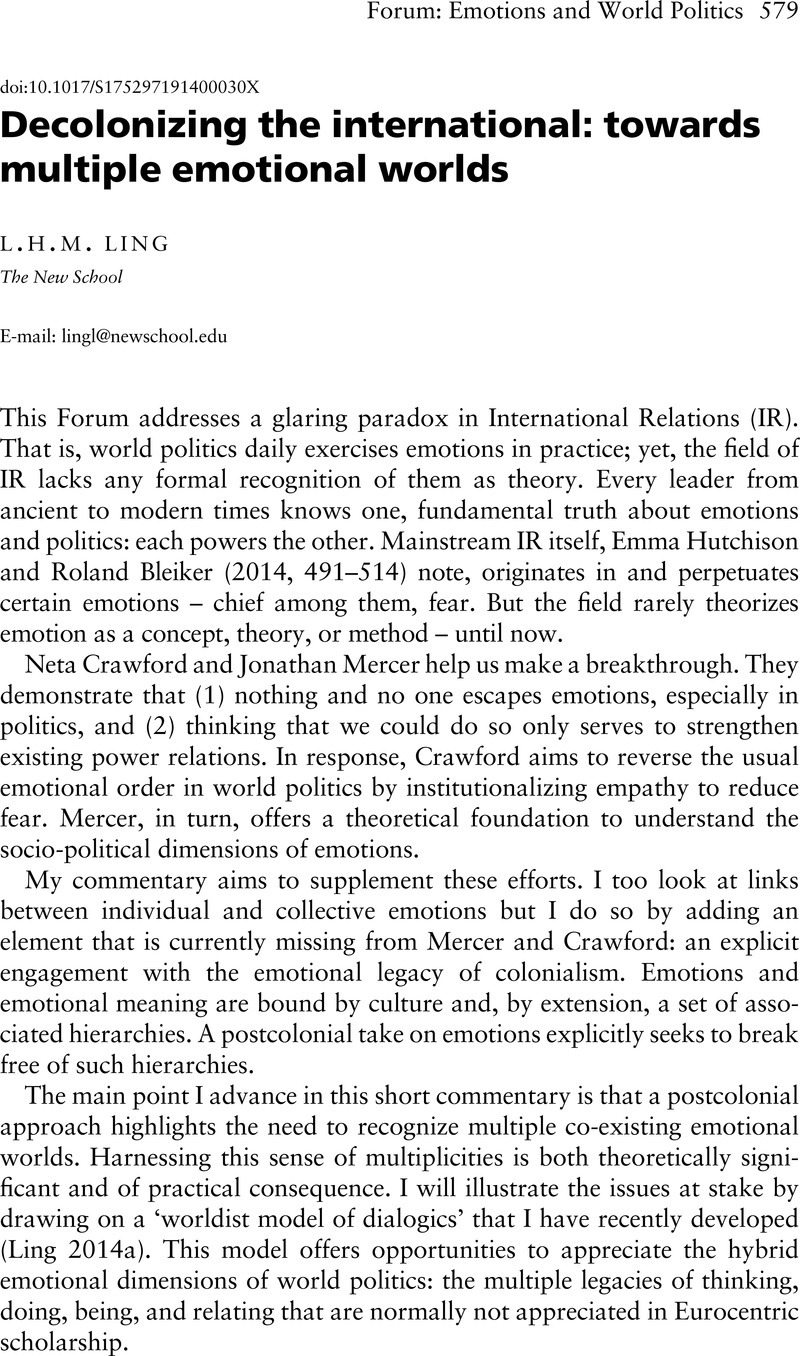Crossref Citations
This article has been cited by the following publications. This list is generated based on data provided by Crossref.
Hutchison, Emma
and
Bleiker, Roland
2014.
Theorizing emotions in world politics.
International Theory,
Vol. 6,
Issue. 3,
p.
491.
Liu, Tony Tai-Ting
2016.
Teaching IR to the Global South: Some Reflections and Insights.
Revista Brasileira de Política Internacional,
Vol. 59,
Issue. 2,
Hayhurst, Lyndsay M. C.
and
Szto, Courtney
2016.
Corporatizating Activism Through Sport-Focused Social Justice? Investigating Nike’s Corporate Responsibility Initiatives in Sport for Development and Peace.
Journal of Sport and Social Issues,
Vol. 40,
Issue. 6,
p.
522.
Clément, Maéva
Lindemann, Thomas
and
Sangar, Eric
2017.
The “Hero‐Protector Narrative”: Manufacturing Emotional Consent for the Use of Force.
Political Psychology,
Vol. 38,
Issue. 6,
p.
991.
Rösch, Felix
and
Watanabe, Atsuko
2017.
Approaching the unsynthesizable in international politics: Giving substance to security discourses throughbasso ostinato?.
European Journal of International Relations,
Vol. 23,
Issue. 3,
p.
609.
Gabay, Clive
and
Ilcan, Suzan
2017.
The Affective Politics of the Sustainable Development Goals: Partnership, Capacity-Building, and Big Data.
Globalizations,
Vol. 14,
Issue. 3,
p.
468.
Clément, Maéva
and
Sangar, Eric
2018.
Researching Emotions in International Relations.
p.
1.
Sangar, Eric
Clément, Maéva
and
Lindemann, Thomas
2018.
Researching Emotions in International Relations.
p.
179.
Hayhurst, Lyndsay M. C.
Sundstrom, Lisa McIntosh
and
Waldman, Devra
2018.
The Palgrave Handbook of Feminism and Sport, Leisure and Physical Education.
p.
589.
Rösch, Felix
2018.
The Power of Dance: Teaching International Relations Through Contact Improvisation.
International Studies Perspectives,
Vol. 19,
Issue. 1,
p.
67.
Alexander, Ronni
2019.
Exploring Betty A. Reardon’s Perspective on Peace Education.
Vol. 20,
Issue. ,
p.
151.
Birkedal, Katarina HS
2019.
Closing traps: Emotional attachment, intervention and juxtaposition in cosplay and International Relations.
Journal of International Political Theory,
Vol. 15,
Issue. 2,
p.
188.
Coşkun, Efser Rana
2019.
The role of emotions during the Arab Spring in Tunisia and Egypt in light of repertoires.
Globalizations,
Vol. 16,
Issue. 7,
p.
1198.
Peterson, V. Spike
2020.
Family matters in racial logics: Tracing intimacies, inequalities, and ideologies.
Review of International Studies,
Vol. 46,
Issue. 2,
p.
177.
Kumral, Mehmet Akif
2020.
Exploring Emotions in Turkey-Iran Relations.
p.
1.
KURU, Deniz
2020.
Dialogue of the “Globals”: Connecting Global IR to Global Intellectual History.
All Azimuth: A Journal of Foreign Policy and Peace,
Jahn, Beate
2021.
Critical theory in crisis? a reconsideration.
European Journal of International Relations,
Vol. 27,
Issue. 4,
p.
1274.
Gustafsson, Karl
and
Hall, Todd H
2021.
The Politics of Emotions in International Relations: Who Gets to Feel What, Whose Emotions Matter, and the “History Problem” in Sino-Japanese Relations.
International Studies Quarterly,
Vol. 65,
Issue. 4,
p.
973.
Saeidi, Shirin
2021.
The politics of the erotic: pious women’s emotional experiences in Hizbollah cultural institutes and the surprises of the anti-feminist movement in post-2009 Iran.
International Feminist Journal of Politics,
Vol. 23,
Issue. 5,
p.
720.
Rösch, Felix
2021.
Affect, practice, and change: Dancing world politics at the Congress of Vienna.
Cooperation and Conflict,
Vol. 56,
Issue. 2,
p.
123.



